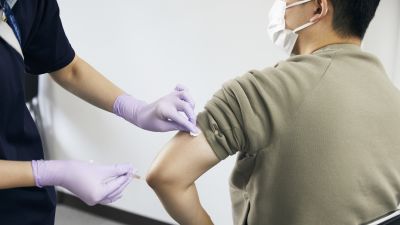Covid: Get ready to start vaccinating by December 14, GPs told

GP surgeries in England have been told prepare staffing coronavirus vaccination centres by December 14.
NHS England and NHS Improvement warned the “scale and complexity” of the immunisation programme would make it “one of the greatest challenges the NHS has ever faced”.
“It is crucial we start to activate local vaccination services to allow priority patient cohorts to start accessing the vaccine,” it said.
"Vaccination sites must be ready to administer 975 doses of the vaccine to priority patients within three-and-a-half days of delivery on December 14," the letter warned.
The speed at which vaccinations are carried out is paramount, as the substance is usually stored at -70C and will only remain stable at fridge temperatures of between 2C-8C for a limited period of time.
There are 975 doses in each of the Pfizer/BioNTech vaccine packs, which has posed a logistical problem of how they can be broken up and distributed to other key sites such as care homes.
The first to receive the vaccine in the centres will be those aged 80 and over, as long as their other risk factors “clinical or otherwise” had been taken into account.
NHS England and NHS Improvement said the number of vaccination sites in each clinical commissioning group (CCG) area will vary according to the number of residents it has who are over 80.
CCGs have been asked to consider inequalities and deprivation – some of the biggest Covid-19 risk factors – when choosing the sites for their vaccination centres.
Who gets priority for the Covid vaccine?
The priority list for “phase one” of the Covid-19 vaccination programme is:
Residents in a care home for older adults and their carers
All those 80 years of age and over and frontline health and social care workers
All those 75 years of age and over
All those 70 years of age and over and people deemed to be clinically extremely vulnerable
All those 65 years of age and over
All individuals aged 16 years to 64 years with underlying health conditions which put them at higher risk of serious disease and mortality
All those 60 years of age and over
All those 55 years of age and over
Once all these sections of the British population are vaccinated, the rest will be worked through.
Each centre will also be supplied with the “IT equipment necessary to deliver the programme and a fridge”, the letter said.
It added: “We will be writing to sites identified as part of wave 1 on Monday, setting out full details of vaccine supply dates, delivery of other consumables and equipment to the site, and the process for assuring readiness before delivery of vaccines.”
It said staff at the vaccination sites would be provided with training, and be “given full support to mobilise within the timescale”.
The staff at the first sites to open are due to get login details for the IT system set up to deliver the vaccination programme “as soon as possible”.
CCGs were told they must “offer all possible assistance” to the vaccine sites as the programme gets under way, including helping them with logistics and setting up clinical waste arrangements.
They were also warned that while urgent care must be provided by GPs even when the vaccine is being delivered, the vaccination programme must be their top priority.
The letter added there is £150 million in funding is available to ensure their is ensure their is staff and resources for GPs to meet their usual obligations and deliver the vaccine programme.
Two nurses demonstrating the vaccination process
It finished: “This is a hugely exciting moment for general practice and you who will be playing a key part in this important programme.”
Meanwhile, the Medicines and Healthcare products Regulatory Agency (MHRA) said it has approved a solution to splitting vaccine packs and getting it into care homes.
Assemblers – a mixture of companies licensed to assemble packs and NHS hospitals with appropriate facilities – will break down the vaccines into smaller batches in special cold rooms at between 2C and 8C.
The process is extremely time sensitive, with assemblers having just 12 hours to thaw the vials, repack the medicines, label them and distribute them to the mobile teams delivering to care homes.